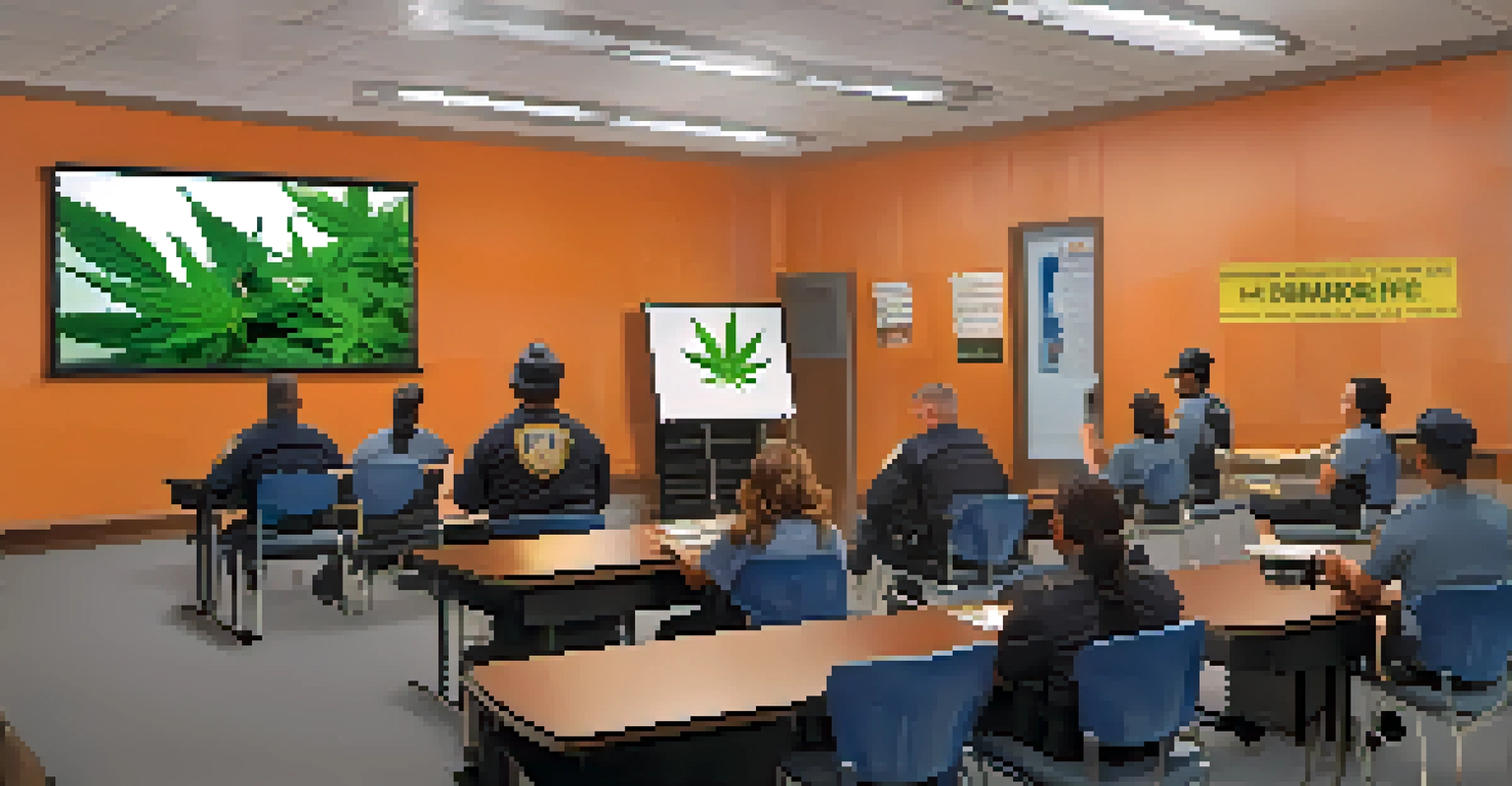Law Enforcement Training on Legal Marijuana Use

Understanding Legal Marijuana: A Shift in Law Enforcement
The legalization of marijuana in various states has created a pressing need for law enforcement agencies to adapt. Officers must understand the nuances of legal versus illegal use, including possession limits and usage contexts. This shift not only affects how they enforce laws but also how they interact with the community regarding drug-related incidents.
The law must be stable, but it must not stand still.
Marijuana laws can vary significantly from state to state, leading to potential confusion on the ground. Training ensures that officers are well-versed in their local statutes, which is crucial for effective policing. For example, what may be legal in one state could lead to serious charges in another, emphasizing the importance of comprehensive education.
By staying informed about these legal landscapes, law enforcement can build trust within the community. Clear communication about the laws can prevent misunderstandings and foster a collaborative environment that prioritizes public safety.
Developing Training Programs for Law Enforcement
Creating effective training programs is essential for law enforcement agencies to manage the complexities of legal marijuana use. Programs should include updated legal information, practical scenarios, and discussion on the social implications of marijuana legalization. This holistic approach helps officers navigate real-world situations with confidence.

Interactive training sessions that incorporate role-playing can be particularly beneficial. Officers can practice responding to various situations involving marijuana use, from routine traffic stops to community outreach events. This hands-on experience can lead to more informed decision-making in the field.
Law Enforcement Needs Updated Training
Law enforcement agencies must develop comprehensive training programs to navigate the complexities of legal marijuana use effectively.
Moreover, collaborating with legal experts, community leaders, and healthcare professionals can enrich these training programs. By bringing diverse perspectives, law enforcement can enhance their understanding and approach to marijuana-related issues.
The Role of Community Engagement in Training
Community engagement plays a crucial role in the effectiveness of law enforcement training on legal marijuana. By involving community members in discussions about marijuana use, police can gain insights into public perceptions and concerns. This dialogue fosters mutual understanding and can help shape training content to address community needs.
Law enforcement officers are the guardians of our rights and freedoms, and they must be equipped to navigate the complexities of modern laws.
For instance, hosting community forums allows law enforcement to present information about legal marijuana and gather feedback from residents. This two-way communication can help dispel myths and build trust, which is essential for effective policing. Community members often have valuable experiences and insights that can inform better practices.
Additionally, involving community organizations in training initiatives can bridge gaps between law enforcement and the public. These partnerships can create a more supportive environment for addressing marijuana-related issues and promote public safety.
Addressing Impairment: Training for Officers
One of the significant challenges law enforcement faces with legal marijuana is determining impairment levels. Officers need specialized training to recognize signs of drug impairment during traffic stops and other interactions. This training should include understanding the effects of marijuana, dosage implications, and user behaviors.
For example, unlike alcohol, the effects of marijuana can vary widely from person to person, complicating impairment assessments. Training programs should equip officers with tools and techniques to conduct field sobriety tests and recognize the nuances of marijuana's impact on behavior and motor skills.
Community Engagement is Essential
Involving community members in discussions about marijuana use fosters understanding and helps shape relevant law enforcement training.
Moreover, ongoing education is crucial as new research emerges regarding marijuana use and impairment. Staying updated helps officers make informed decisions and enhances overall public safety.
Legal Implications for Law Enforcement
Navigating the legal implications of marijuana use is a critical area for law enforcement training. Officers must be aware of their rights and limitations when it comes to searches, seizures, and arrests related to marijuana. Understanding these legal boundaries ensures that they uphold the law while respecting individual rights.
For instance, knowing the difference between probable cause and reasonable suspicion can prevent unlawful searches. Proper training can help officers avoid legal pitfalls that may arise from misunderstandings about marijuana laws, which could lead to costly litigation for both the department and the individuals involved.
Additionally, training should cover the legal consequences of mishandling marijuana-related cases. By understanding the ramifications of their actions, officers can act more judiciously and maintain the integrity of their departments.
The Importance of Mental Health Considerations
Training on legal marijuana use should also incorporate mental health considerations. Many individuals use marijuana for therapeutic reasons, which can influence how officers approach situations involving its use. Understanding the mental health context can foster empathy and lead to better interactions with the public.
For example, an officer who recognizes that a person may be using marijuana to manage anxiety or chronic pain could approach the situation with greater sensitivity. This understanding can help de-escalate potential conflicts and promote more constructive conversations between officers and community members.
Mental Health Considerations Matter
Incorporating mental health aspects into training can help officers approach situations involving marijuana with greater empathy and sensitivity.
Moreover, ongoing mental health training can equip officers with the skills needed to handle various scenarios, including those involving individuals in crisis. By addressing these aspects, law enforcement can improve community relations and contribute to a safer environment.
Evaluating the Effectiveness of Training Programs
To ensure that training programs are effective, law enforcement agencies must implement evaluation measures. Feedback from officers who participate in training can offer valuable insights into what works and what needs improvement. Surveys, interviews, and focus groups can be instrumental in gathering this feedback.
Additionally, tracking the outcomes of training—such as changes in arrest rates or community feedback—can help gauge the impact of these programs. By analyzing this data, agencies can make informed decisions about future training initiatives and better allocate resources.

Ultimately, continuous improvement should be a goal for law enforcement training programs on legal marijuana use. By fostering a culture of evaluation, agencies can adapt to changing laws and community needs, ensuring that they remain effective and relevant.